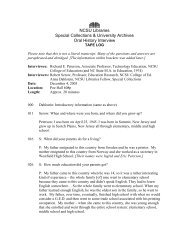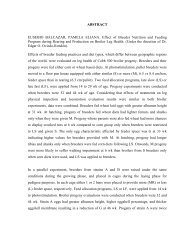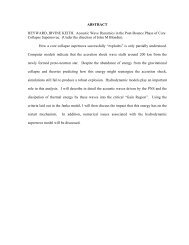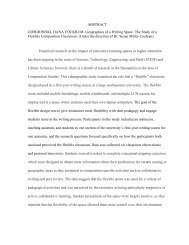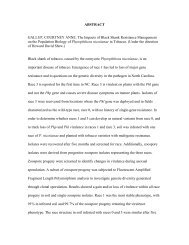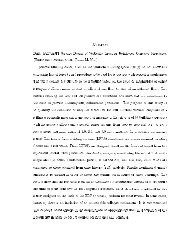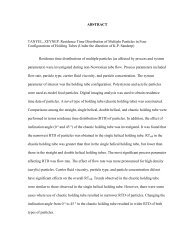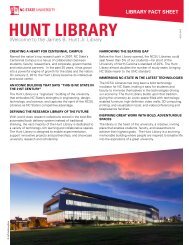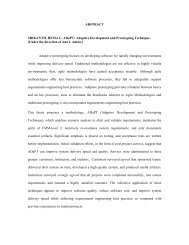SMITH, CHRISTINA JEAN. What Disappears and What Remains
SMITH, CHRISTINA JEAN. What Disappears and What Remains
SMITH, CHRISTINA JEAN. What Disappears and What Remains
You also want an ePaper? Increase the reach of your titles
YUMPU automatically turns print PDFs into web optimized ePapers that Google loves.
Matthew Wolf-Meyer takes a similarly socio-psychological bent in his article,"Apocalypse, Ideology, America: Science Fiction <strong>and</strong> the Myth of the Post-ApocalypticEveryday". In it, Wolf-Meyer proposes that the purpose of post-apocalyptic fiction is toexplore the dominant ideologies of American culture (i.e. Capitalism) in an effort to"underst<strong>and</strong> America", so that we might see ourselves more clearly (the ideologies that driveus) <strong>and</strong> make corrections to avoid these disaster scenarios (30). In this same article Wolf-Meyer also observes:Critics…tend to see the imagined post-apocalyptic world as a staticentity…Readers should, however, see these alternate histories…as glimpses ofnew progressions….for while we may assume that these are narratives ofbeing "bombed into the Stone Age", they are, rather, stories of the post-Atomic Age, <strong>and</strong> histories of a future yet to come (6).And this observation speaks to what I will discuss in the chapters that follow: a study of thefluidity of society, community <strong>and</strong> historical cycles as they are represented in three postapocalypticnarratives that span the sixty years since the A-bomb was dropped onHiroshima. 4The dropping of the Atom Bomb <strong>and</strong> the subsequent technological boom (withall the issues of pollution, over-population <strong>and</strong> climate change that go with these advances) -created a new type of apocalyptic scenario. This modern scenario was not one that may bevisited upon us by an angry God (if we displeased him) or one that would usher in a religiousGolden Age; it was, <strong>and</strong> is, a scenario that presses down upon us, all around us, every day.And so, what do we see when we look past the man-made apocalypse? With no pre-ordainedorder of events, no Anti-Christ or Armageddon <strong>and</strong> no divine power to decide our fates -what becomes of us? <strong>What</strong> few of us remain are left to look around the charred l<strong>and</strong>scape4 And, thus, the sixty years during which post-apocalyptic fiction was being defined <strong>and</strong> validated as a new genre ofliterature apart from the Apocalypticism that preceded it.5



